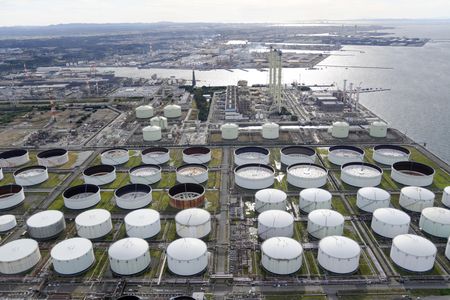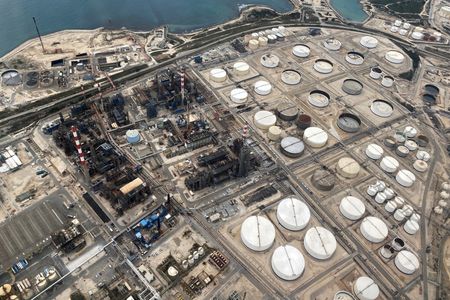By Stephanie Kelly
NEW YORK (Reuters) -Oil prices fell on Monday, paring gains after rising to more than two-month highs, on mixed signals over China, the world’s top crude importer, potentially relaxing its strict COVID-19 restrictions.
Brent crude futures fell 65 cents to settle at $97.92 a barrel. Earlier in the session, they rose to a session high of $99.56 a barrel, the highest since Aug. 31.
U.S. West Texas Intermediate crude dropped 82 cents to settle at $91.79. It earlier rose 74 cents to a session high of $93.74 a barrel, the highest since Aug. 30.
Prices climbed during the session on news that Chinese leaders are considering reopening the economy from strict COVID-19 restrictions but are proceeding slowly and have set no timeline, the Wall Street Journal reported, citing sources.
“The market seems to be thinking that if China opens the economy, that would tighten supply significantly and put further upward pressure on prices,” said Phil Flynn, an analyst at Price Futures Group.
However, weighing on futures, Chinese health officials at the weekend reiterated their commitment to strict COVID containment measures.
Meanwhile, China’s imports and exports contracted unexpectedly in October, but its crude oil imports rebounded to the highest level since May.
Adding some price support, the U.S. dollar sank against the euro on Monday and sterling was supported by risk-on sentiment and a rally in European stock markets. A weakening dollar makes greenback-denominated oil less expensive for other currency holders, helping push prices higher.
Oil prices have also been underpinned by expectations of tighter supplies when the European Union’s embargo on Russia’s seaborne crude exports starts on Dec. 5, even though refineries worldwide are ramping up output.
“For a lot of folks, it looks like there is going to be a scramble for barrels come December, in particular in the euro zone,” said Bob Yawger, director of energy futures at Mizuho in New York.
U.S. oil refiners this quarter will run their plants at breakneck rates, near or above 90% of capacity. China’s largest private refiner Zhejiang Petroleum and Chemical Co (ZPC), meanwhile, is raising diesel output.
Kuwait Integrated Petroleum Industries Co (KIPIC) said on Sunday the first phase of its Al Zour refinery had started commercial operations, the KUNA state news agency reported.
(Reporting by Stephanie Kelly; additional reporting by Rowena Edwards, Florence Tan and Mohi NarayanEditing by David Goodman, Mark Potter, Josie Kao and Paul Simao)


